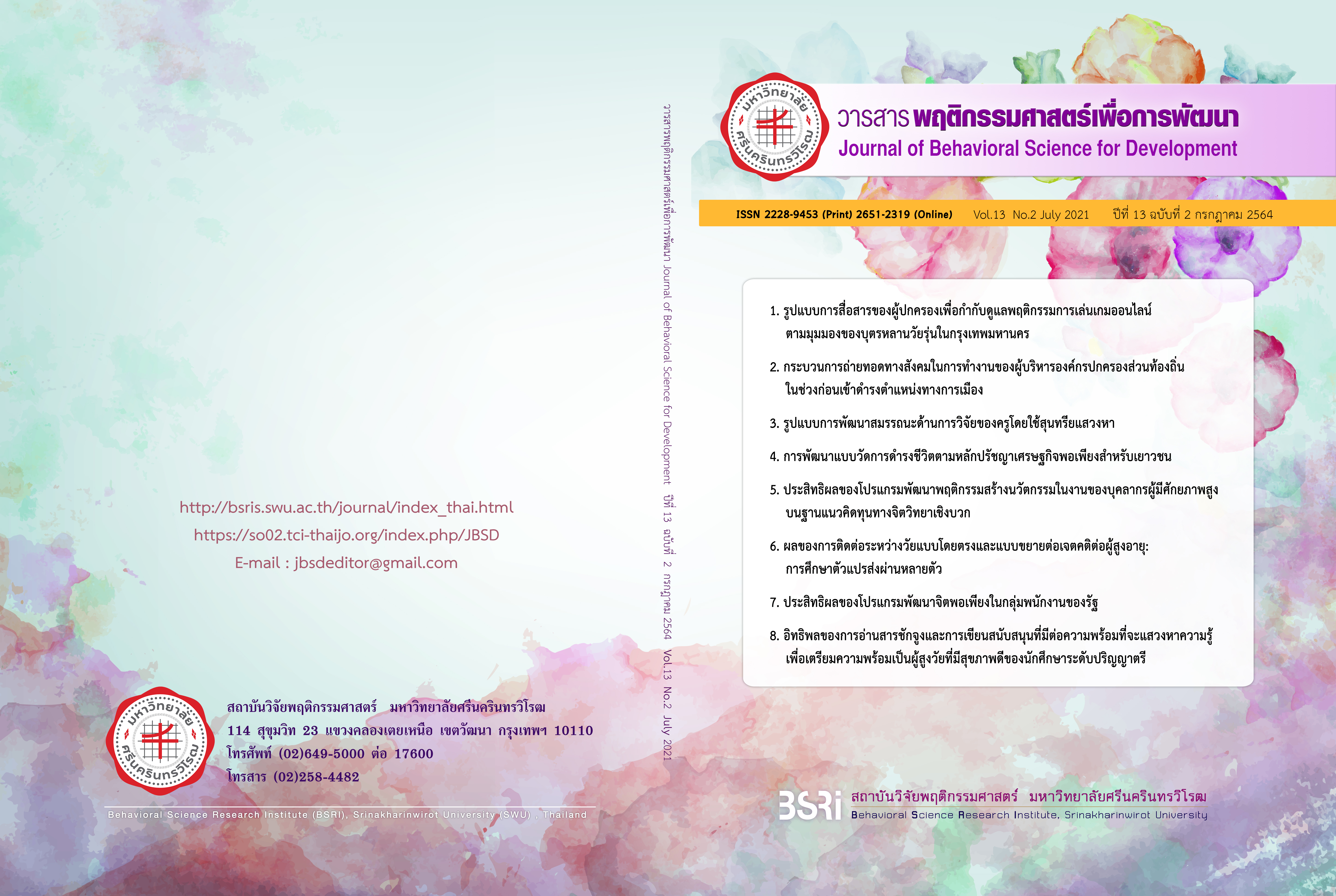Work Socialization Process of the Executives of Local Administrative Organizations before Their Assumption of Political Positions
Keywords:
Work Socialization Process, Executives of Local Administrative Organizations, Good GovernanceAbstract
This qualitative research aimed to understand the work socialization process of the executives of local administrative organizations recognized for excellence in good governance before the executives took the positions. The results showed that work socialization can be separated into 2 subphases which are initial socialization and socialization in advance. In the first subphase, the key contributors were families and educational institutions, and the important results were the development of basic moral principles, the awareness and understanding of roles and responsibilities of local politicians, fundamental knowledge and skills required for higher education, leadership, and collaboration skills. In the second subphase, the key contributors were higher education institutions and former occupations, and the important results were knowledge and skills acquired from studying in the courses of social work, sociology, and anthropology, the development of public consciousness, leadership, teamwork and collaboration skills, and work experience which can be applied to the current positions. This research suggests that educational institutions at all levels should provide courses that cultivate citizenship behavior and good governance by organizing learning activities that allow learners to practice 12 Thai values, civic duties, and good governance.
References
Bass, B. M. (1990). Bass & Stogdill’s Handbook of Leadership: Theory, Research, and Anagerial Applications (3rd ed.). Free Press.
Bhanthumnavin, D. (2008). Kān sangkhro̜ ngānwičhai kīeokap khunnatham čhariyatham nai prathēt Thai læ tāngprathēt [Synthesis of Research on Moral and Ethics in Thailand and Foreign Country]. Moral Promotion Center.
Bhanthumnavin, D. (1995). Thritsadī tonmai čhariyatham: Kānwičhai læ kānphatthanā bukkhon [Psychological Theory of Moral and Work Behaviors: Research and Applications]. National Institute of Development Administration.
Boonleang, S. Naipinich, A., & Phomsakha Na Sakhon Nakhon, T. (2012). Laksana phāwa khō̜ng phū nam thī dī nai kānbō̜rihān ʻongkō̜n pokkhrō̜ng sūan thō̜ngthin [Characteristic of Good Leaders in Local Administrative Organization]. Humanities and Social Sciences, 29(2), 97-112.
Constitution of The Kingdom of Thailand. (2017). Royal Thai Government Gazette, 134(part 40 knor), 74-75.
Deaux, K., & Wrightsman, L. S. (1988). Social Psychology. (5th ed.). Brooks/Cole
Dekker, H. (1991). Political Science Theory and Research. In H. Dekker, & R. Meyenberg (Eds.), Politics and the European Younger Generation: Political Socialization in Eastern, Central and Western Europe (pp.15-58). Oldenburg University. https://www.researchgate.net/publication/234047064_Political_Socialization_Theory_and_Research
Feldman, D. C., & Arnold, H. J. (1983). Managing Individual and Group Behavior in Organization. McGraw-Hill.
Garavan, T. N., & Morley, M. (1997). The Socialization of High-Potential Graduated into The Organization: Initial Expectations, Experiences and Outcomes. Journal of Managerial Psychology, 12(2), 118-137.
Hayden, J. (1995). Professional Socialization and Health Education Preparation. Journal of Health Education, 26(5), 271-276.
Hoskins, D. H. (2014). Consequences of Parenting on Adolescent Outcomes. Societies, 4(3), 506-531. https://doi.org/10.3390/soc4030506
Jewell, L. N. (1998). Contemporary Industrial/Organizational Psychology (3rd ed.). Brooks/Cole.
Karomprach, K. (2011). Krabūankān ʻoprom klō̜mklao thāngkān mư̄ang dān čhariyatham khō̜ng samāchik saphā phūthǣn rātsadō̜n [Moral political socialization of members of the house of representative]. Journal of Behavioral Science, 17(1), 13-54.
Katz, D., & Kahn, R. L. (1978). The Social Psychology of Organization. (2nd ed.). John Wiley & Sons.
Klaykaew, K. K. (2014a). Botbāt khō̜ng khrō̜pkhrūa nai kān plūkfang læ phatthanā khwāmpen phonlamư̄ang dī tām rabō̜p prachāthipatai [The role of families in the fostering and development of children becoming good citizens in a democratic society]. Journal of Behavioral Science, 20(1), 1-18.
Klaykaew, K. K. (2014b). Patčhai thāng dān sathānakān nai khrō̜pkhrūa sathāban kānsưksā læ čhit laksana thī kīeokhō̜ng kap phrưttikam čhariyatham nai kān rīan khō̜ng nisit radap parinyā trī [Psychological characteristics and situational factors as correlates of absorption-study behavior of the first-generation university students]. Journal of Behavioral Science for Development, 6(1), 159-175.
Klaykaew, K. K. (2016). Patčhai thāng dān sathānakān thāng sangkhom læ čhit laksana thī song phon tō̜ phrưttikamkān pen phonlamư̄ang dī tām rabō̜p prachāthipatai [The influences of socialization and psychological characteristics on good democratic citizenship behavior of bachelor degree students]. Journal of Behavioral Science for Development, 8(2), 209-231
Puang-ngam, Kovit. (2007). Kān thutčharit khō̜rapchan nai ʻongkō̜n pokkhrō̜ng sūan thō̜ngthin: Māttrakān læ konkai pō̜ngkan [Corruption in Local Administrative Organizations: Measures and Preventive Mechanisms]. King Prajadhipok's Institute Journal, 5(3), 1-30. https://so06.tci-thaijo.org/index.php/kpi_journal/article/view/244695
Maccoby, E. E. (2016). Historical overview of socialization research and theory. In J. E. Grusec & P. D. Hastings (Eds.), Handbook of Socialization. The Guilford Press.
Miles, M. B., & Huberman, A. M. (1994). Qualitative data analysis: An expanded sourcebook (2nd ed.). Sage.
Neundorf, A., & Smets, K. (2017). Political socialization and the making of citizens. https://www.oxfordhandbooks.com/view/10.1093/oxfordhb/9780199935307.001.0001/oxfordhb-9780199935307-e-98
National Education Act B.E. 2542 and Revised Edition B.E. 2545. (2002). Royal Thai Government Gazette, 119 (part 123 knor), 11. https://www.bic.moe.go.th/images/stories/5Porobor._2542pdf.pdf
Office of Public Sector Development Commission. (2012). Lak thammāphibān khō̜ng kānbō̜rihān kitčhakān bānmư̄ang thī dī [Principles of good governance]. https://www.ocsc.go.th/sites/default/files/attachment/article/7.1_hlakthrrmaaphibaalkhngkaarbrihaarkicchkaarbaanemuuengthiidii.pdf
Owen, D. (2008, September 21-26). Political Socialization in the Twenty-first Century: Recommendations for Researchers. The Future of Civic Education in the 21st Century. Center for Civic Education and the Bundeszentrale. James Madison’s Montpelier.
Peterson, S. A. (1990). Political Behavior: Pattern in Everyday Life. Sage.
Sanitation Act, B.E. 2495 (1952). Royal Thai Government Gazette,69 (part 63), 1275-1276.
Sodmanee, O., & Junprasert, T. (2011). Kānphatthanā khunnatham čhariyatham: Chāk nǣokhit sū kān patibat [Moral principles and ethical development: From concept to practical approach]. Journal of Behavioral Science, 17(1), 18-30.
Samakeetham, S. (2018). Good Governance and Corporate Social Responsibility. National Institute of Development Administration.
Suvannathat, C., Bhanthumnavin, D., & Prachonpachanuk, P. (1978). Phrưttikam sāt lem nưng [Behavioral Science (Vol.1)]. Thai Watana Panich.
Watson, R., & Lindgren, C. W. (1979). Psychology of the Child and the Adolescent (4th ed.). Macmillan.
Yin, R. K. (2003). Case study research: Design and methods (3rd ed.). Sage.
Downloads
Published
How to Cite
Issue
Section
License
Copyright (c) 2021 Journal of Behavioral Science for Development

This work is licensed under a Creative Commons Attribution-NonCommercial-NoDerivatives 4.0 International License.



